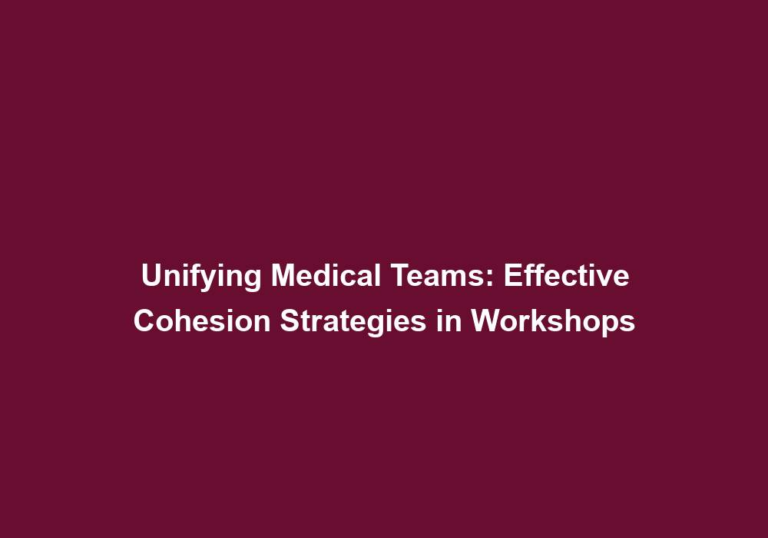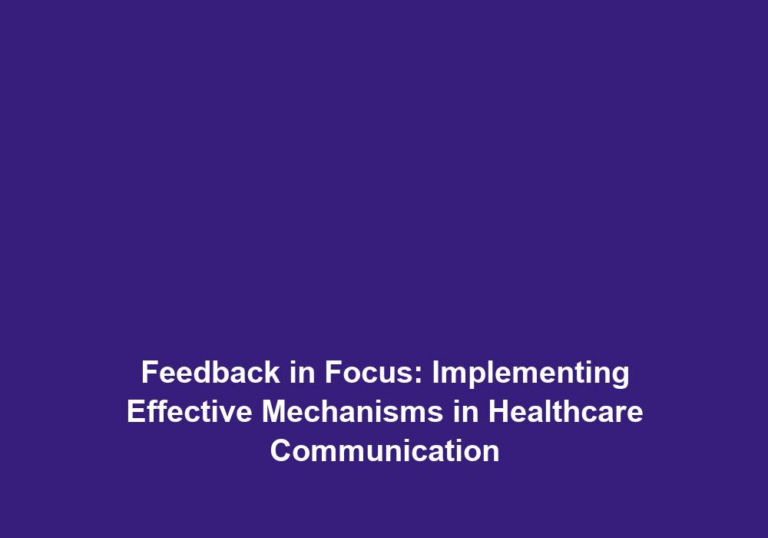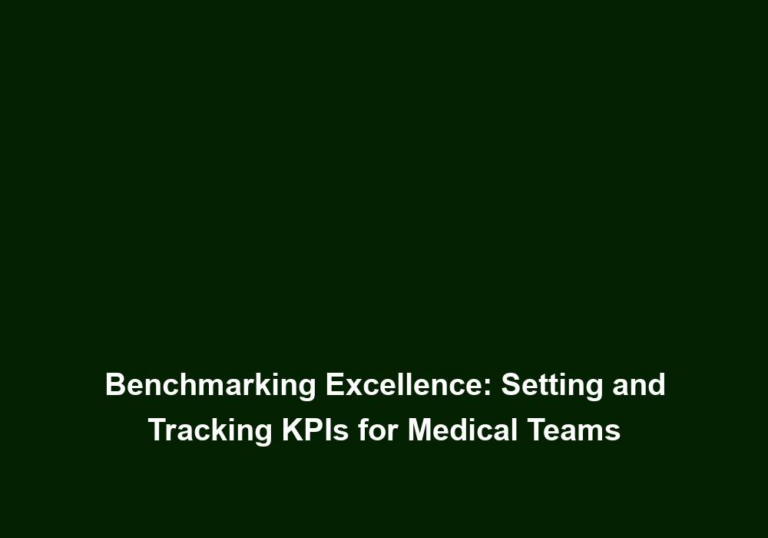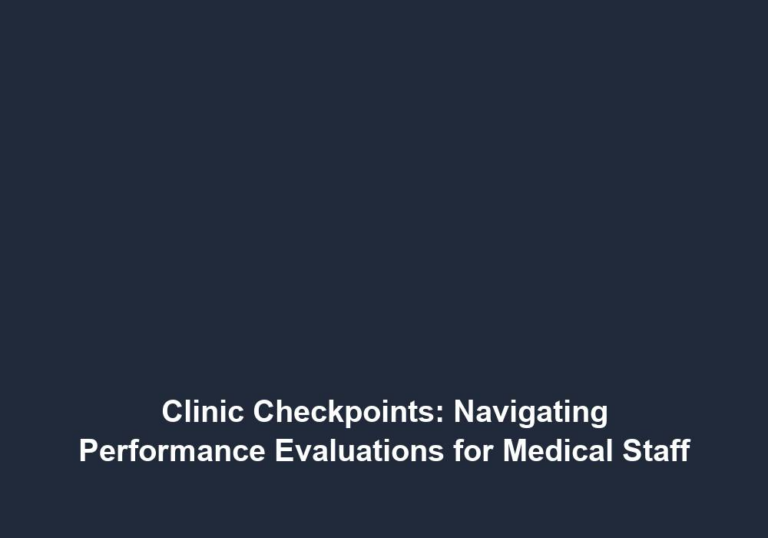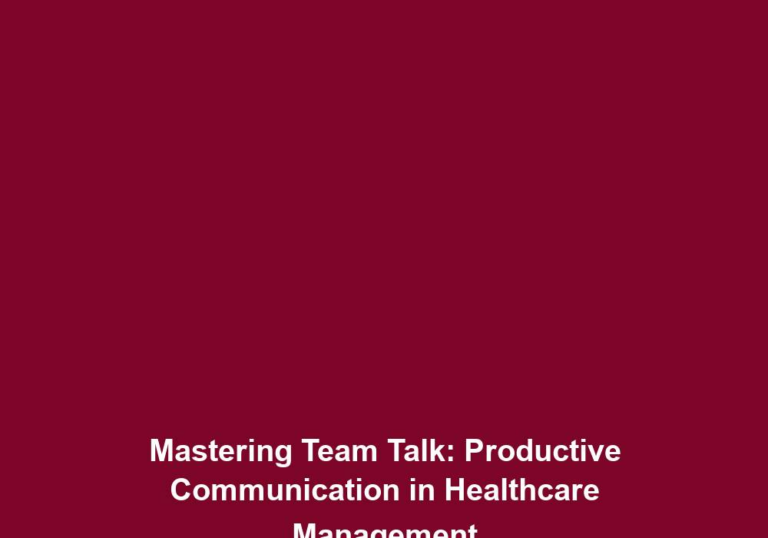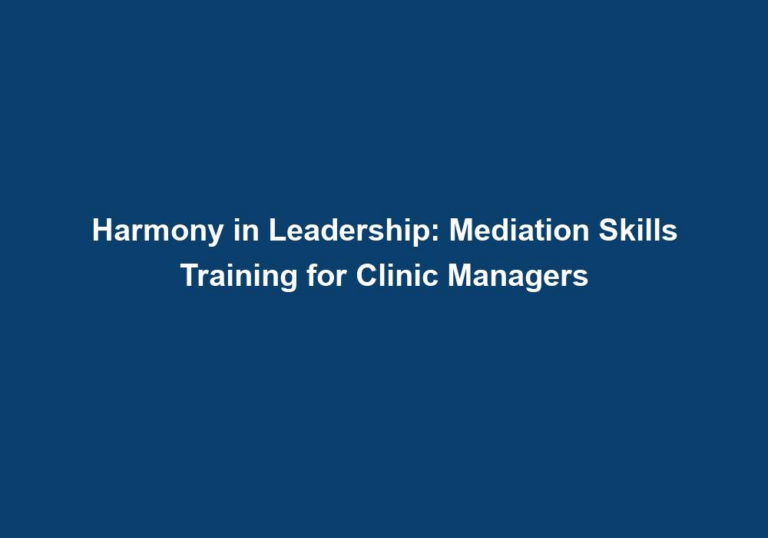Building Bonds: Workshop Strategies for a Cohesive Medical Team
In the fast-paced and demanding world of healthcare, having a cohesive and well-functioning medical team is crucial. A strong team ensures that patients receive the highest quality of care and that the healthcare facility operates smoothly. One effective way to enhance teamwork and foster strong relationships among team members is through workshops specifically designed for this purpose. In this article, we will explore various workshop strategies that can help build bonds within a medical team.
Importance of Team Building in Healthcare
Before diving into workshop strategies, let’s understand why team building is essential in the healthcare industry. A cohesive medical team:
-
Improves Patient Care: When healthcare professionals work well together, they can deliver coordinated and efficient care to patients. This leads to better outcomes and improved patient satisfaction.
-
Enhances Communication: Effective communication is vital in any healthcare setting. Team building workshops help team members develop strong communication skills, enabling them to convey information accurately and collaborate more efficiently.
Effective communication is not only about exchanging information but also about active listening, understanding non-verbal cues, and adapting communication styles to different situations. Team members can engage in activities such as role-playing exercises to practice their communication skills in a safe and controlled environment. Through these exercises, they can learn to express their ideas clearly, ask relevant questions, and provide constructive feedback. Additionally, workshops can provide insights into communication strategies tailored to different healthcare scenarios, such as communicating with patients and their families or collaborating with other departments within the healthcare facility.
- Boosts Morale and Job Satisfaction: When team members feel connected and valued, job satisfaction and morale increase. This positivity often translates into better patient experiences and outcomes.
To foster morale and job satisfaction, workshops can focus on building a positive team culture and recognizing individual contributions. Team members can engage in activities that promote appreciation and recognition, such as sharing success stories, expressing gratitude, or organizing team-building events outside of work. Additionally, workshops can provide opportunities for team members to voice their opinions and concerns, creating a sense of ownership and inclusion. By fostering a supportive and inclusive environment, team building workshops can enhance job satisfaction, improve retention rates, and create a positive work atmosphere.
- Reduces Errors and Improves Safety: A tightly knit team is more likely to notice and address potential errors or safety concerns promptly. Team building exercises can improve situational awareness and foster a culture of safety within the medical team.
Workshops can focus on enhancing situational awareness and promoting a culture of safety. Team members can participate in activities that simulate real-life scenarios, allowing them to practice identifying potential risks and implementing appropriate safety measures. These exercises can also emphasize the importance of clear communication during critical situations, ensuring that vital information is effectively shared among team members. By creating a culture where safety is prioritized and team members feel comfortable speaking up about potential risks, workshops can significantly reduce errors and improve patient safety outcomes.
Now that we understand the importance of team building in healthcare, let’s explore some workshop strategies that can be highly effective.
1. Icebreaker Activities
Icebreaker activities are an excellent way to kickstart a workshop and help team members become more comfortable with each other. These activities can include:
-
Two Truths and a Lie: Each team member shares two true statements and one false statement about themselves. The rest of the group must guess which statement is false, encouraging interaction and conversation.
-
Human Bingo: Participants mingle and find team members who fit various descriptions listed on a bingo card. This activity encourages individuals to interact and learn more about their colleagues.
Icebreaker activities serve as a starting point for building connections and fostering a sense of camaraderie among team members. These activities break down barriers, encourage communication, and create a more relaxed and open atmosphere. By promoting interaction and conversation, icebreaker activities lay the foundation for stronger relationships and effective teamwork.
2. Team-Building Exercises
Team-building exercises are designed to promote teamwork, trust, and collaboration. Some effective exercises for medical teams include:
-
Scavenger Hunt: Divide the team into smaller groups and provide them with a list of items or tasks they must complete. This exercise encourages problem-solving, communication, and cooperation.
-
Trust Falls: While this exercise should be done with caution and under proper supervision, trust falls can help team members build trust and develop strong communication skills.
Team-building exercises create opportunities for team members to work together towards a common goal, fostering a sense of unity and trust. These exercises require collaboration, effective communication, problem-solving, and decision-making skills, mirroring the challenges faced in a healthcare setting. By participating in these exercises, team members can learn to rely on each other, appreciate individual strengths, and develop a deeper understanding of their collective capabilities.
3. Group Discussions and Case Studies
Engaging in group discussions and analyzing case studies can foster critical thinking, encourage knowledge sharing, and improve decision-making skills. Consider the following strategies:
-
Roundtable Discussions: Select relevant healthcare topics or challenges and encourage team members to share their insights and experiences. This promotes open communication and collaboration.
-
Case Studies: Present real or hypothetical scenarios that the team might encounter in their daily work. Discussing these cases can help team members develop problem-solving skills and consider different perspectives.
Group discussions and case studies provide opportunities for team members to learn from each other’s experiences and expertise. These activities stimulate critical thinking, encourage the exchange of ideas, and promote a deeper understanding of complex healthcare situations. By engaging in discussions and analyzing case studies, team members can enhance their analytical and decision-making skills, learn from best practices, and develop innovative solutions to challenges they may face in their work.
4. Role-Playing Exercises
Role-playing exercises allow team members to practice their skills in a safe and controlled environment. Some role-playing scenarios for medical teams include:
-
Conflict Resolution: Simulate situations where conflicts may arise between team members. This exercise helps individuals learn effective ways to resolve conflicts and enhances communication skills.
-
Patient Interactions: Role-play scenarios involving challenging patient interactions can help team members develop empathy, active listening, and effective communication skills.
Role-playing exercises provide a hands-on approach to learning and skill development. By simulating real-life scenarios, team members can practice their problem-solving, communication, and decision-making skills in a controlled environment. These exercises allow team members to experiment with different approaches, receive constructive feedback, and refine their techniques. By gaining experience through role-playing exercises, team members can improve their ability to handle challenging situations with confidence and empathy.
5. Workshops on Emotional Intelligence
Emotional intelligence plays a crucial role in building strong relationships and effective teamwork. Conduct workshops focused on emotional intelligence to enhance self-awareness, empathy, and collaboration. Some workshop activities include:
-
Personality Assessments: Encourage team members to take personality assessments such as the Myers-Briggs Type Indicator (MBTI) or the DISC assessment. These assessments help individuals understand themselves and their colleagues better, leading to improved teamwork.
-
Emotional Intelligence Workshops: Facilitate discussions and activities that help team members recognize and manage their emotions, understand the emotions of others, and work together harmoniously.
Emotional intelligence workshops provide team members with tools and strategies to navigate their emotions and interpersonal relationships effectively. Through personality assessments, team members can gain insights into their own strengths, weaknesses, and communication styles. This self-awareness promotes empathy and understanding, allowing team members to adapt their approach accordingly and build stronger relationships. Additionally, workshops focused on emotional intelligence can provide techniques for managing conflicts, enhancing active listening skills, and fostering a collaborative and supportive team environment.
By implementing these workshop strategies, medical teams can strengthen their bonds, improve communication, and enhance patient care. Investing time and effort in team building workshops ultimately leads to a happier, more efficient, and cohesive medical team.


